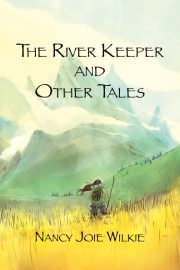Our Timely Obsession with Animal Crossing
by Tiffany Meuret
It’s curious to witness the hold Animal Crossing has had on the SF/F and writing community. It’s wholesome, inclusive, and open-ended enough that players can create their own small fantasies within it—all desperate necessities during a pandemic and subsequent global unrest. Our world is in flux, our futures uncertain, but let me tell you that I am elated to announce that I have recreated my favorite scene from the movie Deep Blue Sea on my island. You also better believe that I showed it to every member of my family, too.
Explanations abound for the game’s sudden explosion in popularity, but I have noticed a particularly common camaraderie among fellow writers. What is it about this game, with so many other open-concept games already in existence, that draws writers to it with such gusto? The timing of release and the sweetness of the game in such dark times are no doubt factors, but I believe it goes deeper than that, down to the very core of our creative hearts.
Humans like to make things. We love to hold them up to the light and have others admire our creations, but making things takes time, patience, and massive emotional investment, all qualities in short supply as the world crumbles at our feet. Animal Crossing allows us to do just that, providing us with tools, settings, and resources to let our imaginations run wild.
You start the game with a cot, a lantern, and a tent. The rest is up to you and how much you want to adhere to the passive-aggressive advice of Tom Nook, the raccoon who operates the village store. The scope of the game requires a player to build their island from the ground up—from upgrading your home, to crafting furniture and accessories, to terraforming the island itself, but the storytelling happens right in that first moment when Tom Nook asks you to stake out a spot for your tent. I remember circling the areas of the island I could reach (mountains and rivers cutting off access to the rest) and thinking rather critically about my placement. I wanted to be near the water, and so staked my tent right by a waterfall, imagining falling asleep to the sounds of it at night.
From that moment on, I unconsciously spun the narrative of my experience. From the clothes I wore to where I placed the coin-operated tourist binoculars I’d shot out of a balloon with a slingshot, I was crafting a story within this story-less game. This is the garden where I breed pink roses. Here is my carnival for when I need a bit of a thrill, outfitted with a popcorn machine and a teacup ride. There is the playground and community pool where I’ll meet my friends on the weekend, lined with color-coded tables for playing chess. Every piece of wallpaper, every color, every pair of jelly sandals I place on my chibi feet are dishing out tone and theme and mood.
And then there are the villagers. They are a delight to witness as they flit about the island, munching on popsicles, singing, or sprinting Naruto-style on the beach. I’ve dedicated far too many hours to crafting and designing spaces on my island that my residents might enjoy, despite many of the items being stationary and non-interactive. My imagination does all the work the game does not.
As writers, we tend to portion pieces of ourselves into our work, but in this climate there isn’t much left of us to give. So, we need help. Animal Crossing, in all its simplicity, has captured our storytelling souls because it provides the scaffolding to create. It does the heavy lifting we are so used to doing on our own. Now, as isolated and stressed as we all are, we still can connect as we travel to one another’s dreamy little islands, proud tour guides to a world previously existing only in our heads. Animal Crossing allows us to connect with our people, no matter how far away, and say, “Look what I made!”
Now, if you’ll excuse me, I have some grasshoppers to catch.
Tiffany Meuret is a writer of twisted fairytales hailing from Phoenix, Arizona. Her short work can be found in Shoreline of Infinity, Luna Station Quarterly, The Molotov Cocktail, and others. Her debut novel, A Flood of Posies, releases in February 2021 with Black Spot Books. Find her on Twitter (@TMeuretBooks) for ramblings about her kids, dogs, and how hot it is in Phoenix.


